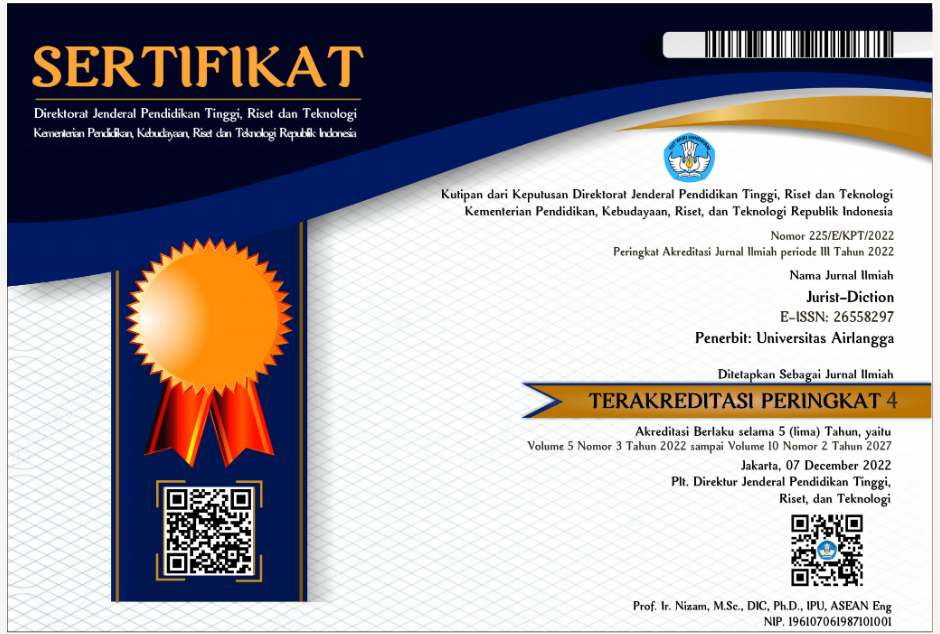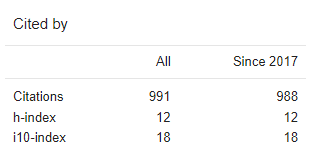Dialektika Emergency of State dan Tujuan Hukum Dalam Penetapan PERPPU 2/2022 Menjadi Undang-Undang
Downloads
Abstract
This article discusses how the dialectic of emergency of state with the principle of legal objectives against the stipulation of Government Regulation instead of Law (PERPPU) Number 2 of 2022 on Job Creation into Law Number 6 of 2023. The research method uses a normative legal research model. The results showed that forming regulations on job creation in Indonesia is a dynamic aspect of policy formulation for the community, either pro or con. The state's emergency is interpreted subjectively, where the President has the authority to issue PERPPU if the country is in a dangerous situation to prevent a legal vacuum. The lawful purpose of the stipulation does not only stop at the aspect of legal certainty but needs to pay attention to the principles of justice and expediency as the purpose of the nation and state.
Keywords: Government Regulation Liew of Law, Job Creation, Emergency State, Purpose of Law.
Abstrak
Artikel ini membahas bagaimana dialektika emergency of state dengan prinsip tujuan hukum terhadap penetapan Peraturan Pemerintah Pengganti Undang-Undang (PERPPU) Nomor 2 Tahun 2022 tentang Cipta Kerja menjadi Undang-Undang Nomor 6 Tahun 2023. Metode penelitian menggunakan model penelitian hukum normatif. Hasil penelitian menunjukan bahwa pembentukan peraturan tentang cipta kerja di Indonesia merupakan aspek dinamis dalam perumusan kebijakan terhadap masyarakat baik pro atau kontra. Emergency of state ditafsirkan secara subjektif, dimana Presiden memiliki kewenangan untuk menerbitkan PERPPU apabila negara berada di situasi berbahaya untuk mencegah kekosongan hukum. Tujuan hukum penetapan tersebut tidak hanya berhenti pada aspek kepastian hukum semata, namun perlu memperhatikan prinsip keadilan serta kemanfaatan sebagaimana tujuan berbangsa dan bernegara.
Keywords: Perppu; Cipta Kerja; Emergency State;Tujuan Hukum.
Buku
Daniel C.K. Chow, dan Thomas J. Shoenbaum, International Trade Law: Problems, Cases, and Materials, Ed. 2 (Wolters Kluwer, 2013).
Muhammad Sood, Hukum Perdagangan Internasional, Ed. 2 (Rajawali Pers, 2018).
Paul Erwin R. Simanjuntak, Anti Dumping Dalam WTO: Penentuan Harga Normal dan Produk Sejenis Dalam Menetapkan Kebijakan (Jala Permata Aksara, 2019).
Jurnal
Aktieva Tri Tjitrawati, ‘Pembentukan Kerangka Hukum Internasional Bagi Pencegahan Perdagangan Kayu Ilegal' (2012), 27 Yuridika.
Alessandra Arcuri, ‘Back to the Future: US-Tuna II and the New Environment-Trade Debate', (2012), 3 European Journal of Risk Regulation.
Dewa Gede Sudika Mangku, ‘Suatu Kajian Umum Tentang Penyelesaian Sengketa Internasional Termasuk di Dalam Tubuh ASEAN' (2012) 17 Jurnal Perspektif.
Intan Soeparna, ‘An Analysis of the Role of Economic Actors in the WTO Dispute Settlement System' (2015), 30 Yuridika.
Jonathan Carlone, ‘An Added Exception to the TBT Agreement After Clove, Tuna II, and Cool' (2014) 37 Boston College International and Comparative Law Review.
Juanita Fonseca Duffo, et.al., ‘The Legitimate Regulatory Distinction in the TBT Agreement: Evoulution, Criticism, and Perspectives' (2015), 12 Universitas Estudiantes.
Juscelino F. Colares, dan William P. Canterberry, ‘US-COOL: How the Appellate Body Misconstrued the National Treatment Principle, Severely Restricting Agency Discretion yo Promulgate Mandatory, Pro-Consumer Labeling Rules' (2017), 51 Journal of the World Trade.
Lucas Ballet, ‘Losing Flavor: Indonesia's WTO Complaints Against the U.S. Ban on Clove Cigarettes' (2011), 26 American University International Law Review.
Meredith A. Crowley, dan Robert Howse, ‘Tuna-Dolphin II: A legal and economic analysis of the Appellate Body Report' (2014), 13 World Trade Review.
Petros C. Mavroidis, ‘Last Mile for Tuna (to a Safe Harbour): What is the TBT Agreement All About?' (2019), 30 The European Journal of International Law.
Robert Howse, dan Philip I. Levy, ‘The TBT Panels: US-Cloves, US-Tuna, US-COOL' (2013) 12 World Trade Review.
Laman
World Trade Organization, ‘DS406: United States – Measures Affecting the Production and Sale of Clove Cigarettes', <https://www.wto.org/english/ Tratop_e/dispu_e/cases_e/ds406_e.htm> dikunjungi pada tanggal 22 Juni 2021.
World Trade Organization, ‘DS396: United States – Certain Country of Origin Labelling Requirements', <https://www.wto.org/english/tratop_e/dispu _e/cases_e/ds386_e.htm>, dikunjungi pada tanggal 22 Juni 2021.
World Trade Organization, ‘DS381: United States – Measures Concerning the Importation, Marketing and Sale of Tuna and Tuna Products', , dikunjungi pada tanggal 22 Juni 2021.
Dokumen Internasional
World Trade Organization, United States – Measures Concerning the Importation, Marketing and Sale of Tuna and Tuna Products, Reports of the Appellate Body, (WT/DS381/AB/R, 2012).
World Trade Organization, United States – Certain Country of Origin Labelling (COOL) Requirements, Reports of the Appellate Body, (WT/DS384/AB/R, WT/DS386/AB/R, 2012).
World Trade Organization, United States – Measures Affecting the Production and Sale of Clove Cigarettes, Report of the Appellate Body, (WT/DS406/AB/R, 2012).
World Trade Organization, United States – Measures Concerning the Importation, Marketing and Sale of Tuns and Tuna Products, Report of the Panel, (WT/DS381/R, 2011).
World Trade Organization, United States – Certain Country of Origin Labelling (COOL) Requirements, Reports of the Panel, (WT/DS384/R, WT/DS386/R, 2011).
World Trade Organization, United States – Measures Affecting the Production and Sale of Clove Cigarettes, Report of the Panel, (WT/DS406/R, 2011).
World Trade Organization, United States – Certain Country of Origin Labelling (COOL) Requirements, Request for the Establishment of a Panel by Canada, (WT/DS384/8, 2009).
World Trade Organization, United States – Measures Concerning the Importation, Marketing and Sale of Tuna and Tuna Products, US Appellee Submission, (DS381, 2012).
Copyright (c) 2023 Faraz Almira Arelia

This work is licensed under a Creative Commons Attribution 4.0 International License.
Jurist-Diction (P-ISSN 2721-8392, E-ISSN 2655-8297), published by Universitas Airlangga, is licensed under the Creative Commons Attribution 4.0 International License (CC BY 4.0).
This license permits users to:
- Share – copy and redistribute the material in any medium or format;
- Adapt – remix, transform, and build upon the material for any purpose, including commercial use.
These freedoms are granted under the following conditions:
Attribution – You must provide appropriate credit, include a link to the license, and indicate if any changes were made. This may be done in any reasonable manner, but not in a way that suggests the licensor endorses you or your use.
No additional restrictions – You may not apply legal terms or technological measures that restrict others from exercising the rights granted under the license.
Note: As of Volume 5, No. 1 (2022), Jurist-Diction has adopted the Creative Commons Attribution 4.0 International License (CC BY 4.0), replacing its previous license (CC BY-NC-SA).


















